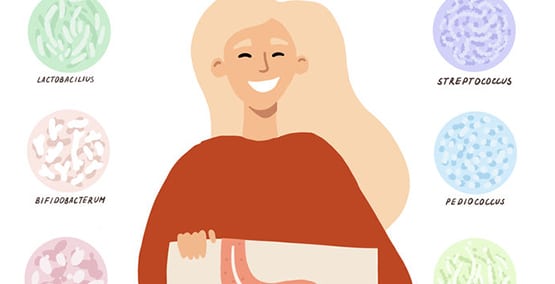
Intestinal bacteria in Crohn's disease – and why you need to be nice to them
The roll of good bacteria and probiotics in IBD
-You and I supposedly have around 100 trillion cells in our body as adults. What's more amazing is that we have 10 to 100 times that many bacteria and other organisms living inside us–more than a quadrillion. We have some in our mouths. Women have some in their vaginas. Most are in our lower intestines. So as someone said, the cute phrase really should be "me, myself and us."
These natural organisms, what we call our intestinal flora, or microbiome, is a combination of bacteria, parasites including yeast, and maybe some viruses, residing together in the colon. They need us to live, certainly. But we need them as well–or at least, some of them, the ones that manufacture some of our essential nutrients, like vitamin K and some of the B vitamins (niacin, biotin, and pantothenic acid) and the ones that feed on the foods that haven't been absorbed elsewhere and help to lessen the gas we pass.
What we're starting to discover is how the balance is so important. Some of these bacteria attach to the intestinal wall and protect us from the organisms that can cause infections and perhaps trigger some of auto-immune diseases. They may even block some allergy-producing foods from entering from the intestine to get in the blood stream and other tissues.
What we also know is that some intestinal bacteria are potentially disease producing. For example, Clostridium difficile (known as c diff) in is most of everyone's intestine, even as infants. It does no harm until the other bacteria don't protect against it anymore–which can happen if some of the antibiotics used to treat another infection, wipe out the protective organisms and allow c diff to fluorish.

Probiotics
We've known this for a while, which is why some people take probiotics. These are packaged bacteria and organisms that they want to populate their intestines. The classic that most people know about is Lactobacillus acidophillus. It's one of the good bacteria that lessens the gas we produce and protects us from infections. However, much of what is taken as a pill is killed off by stomach acid. So some people eat yogurt, but the problem is that you have to eat an awful lot of yogurt to get the same amount of organisms as in a pill, but you may not need as many that way, because the yogurt helps to buffer the stomach acid and allow an easier past that protective barrier. (More about this in my blogpost about pre- and probiotics).
Probiotics and Inflammatory Bowel Disease (IBD)
So the obvious thought would be to take a probiotic to help heal the intestine in Crohn's disease and ulcerative colitis. The problem is it doesn't work. The pediatric IBD community did a study giving a common probiotic to some patients and a placebo to others. The patients who did not take the probiotic did better. Why? If you read my blogpost on the cause of Crohn's, I said that in an animal model, those with the disease have an immune defect that reacts to intestinal bacteria–in fact it seems that there's an overreaction that causes the intestinal injury. Doesn't necessarily matter whether it's good or bad bacteria being introduced–the reaction occurs.
In ulcerative colitis, tests have been done with a certain combination of 8 probiotics in very large quantity. It helps adult patients, both those who have early stages of the disease and those who have had surgery to remove their colons. But in a predictive study on children with UC, taking this same probiotic along with routine therapy was no more effective and slightly more expensive than just staying on the routine therapy alone.
The Better Approach
So instead of adding bacteria in the form of a single or combination probiotic, feed your own bacteria better–with a diet that supports the good, protective bacteria. (See my blogpost on diets for IBD).




